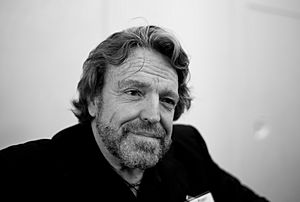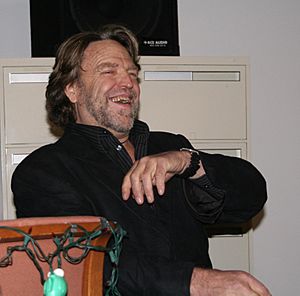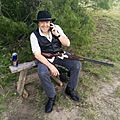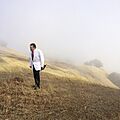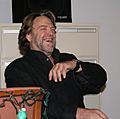John Perry Barlow facts for kids
Quick facts for kids
John Perry Barlow
|
|
|---|---|
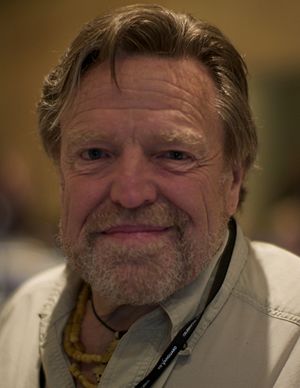
Barlow in August 2012
|
|
| Born | October 3, 1947 near Cora, Wyoming, U.S. |
| Died | February 7, 2018 (aged 70) San Francisco, California, U.S. |
| Occupation | |
| Alma mater | Wesleyan University |
| Period | 1971–95 (lyrics) 1990–2018 (essays) |
| Subject | Internet (essays) |
John Perry Barlow (October 3, 1947 – February 7, 2018) was an American poet, essayist, and political activist. He was also a lyricist for the famous band Grateful Dead. Barlow helped start important groups like the Electronic Frontier Foundation and the Freedom of the Press Foundation. He was also an early expert at Harvard University's Berkman Klein Center for Internet & Society, focusing on how the internet changes society.
Contents
Early Life and Learning
Barlow was born in Sublette County, Wyoming, near a town called Cora. He was the only child of Norman Walker Barlow, a state politician, and Miriam Adeline Barlow.
He grew up on a large ranch called Bar Cross Ranch in Cora, Wyoming. This ranch was started by his great-uncle in 1907. He went to elementary school in a small, one-room schoolhouse.
Even though his school grades were not always perfect, Barlow was accepted into many top universities. This was partly because he was from Wyoming, where not many students applied. In 1969, he graduated from Wesleyan University.
After college, Barlow decided to travel the world for two years. He spent nine months in India and also lived in New York City. He even tried writing a novel, but it was never published.
Working with the Grateful Dead
Meeting Bob Weir
When Barlow was 15, he went to the Fountain Valley School in Colorado Springs, Colorado. There, he met Bob Weir, who later helped create the band Grateful Dead. They became close friends and stayed that way for many years.
In 1971, Barlow was planning to join the Grateful Dead in California. However, he stopped at his family's ranch because his father was very ill. His father passed away in 1972, leaving the ranch with a lot of debt. Barlow decided to stay and help manage the ranch for nearly 20 years.
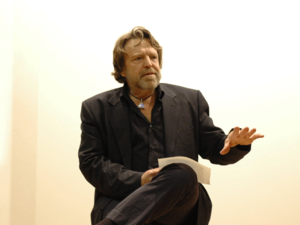
Barlow became interested in writing songs with Bob Weir in 1971. Before this, Weir mostly worked with another lyricist, Robert Hunter. Hunter liked his lyrics to be sung exactly as he wrote them. After a disagreement, Hunter told Barlow to work with Weir.
Writing Songs
In late 1971, Weir and Barlow started writing songs together. They created famous songs like "Cassidy", "Mexicali Blues", and "Black-Throated Wind". These songs were played by the Grateful Dead and in Weir's solo shows for many years.
Barlow also wrote songs with other Grateful Dead members. He worked with keyboardist Brent Mydland on four songs for the 1989 album Built to Last. He also wrote one song with Vince Welnick, who took over after Mydland.
Internet Activism
A Vision for Cyberspace
In 1996, Barlow wrote an important document called "A Declaration of the Independence of Cyberspace". This paper shared his strong beliefs about how the internet should be free and independent.
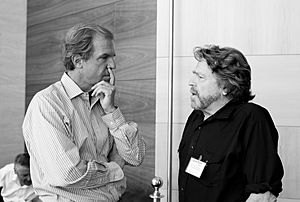
In 1986, Barlow joined The WELL, an early online community. In 1990, he co-founded the Electronic Frontier Foundation (EFF) with other digital rights activists. The EFF works to protect digital rights and privacy for everyone online.
As part of EFF, Barlow helped bring attention to a government raid on a company called Steve Jackson Games. EFF later supported Steve Jackson Games in a lawsuit, which they won in 1993.
In 1996, Barlow spoke to a middle school class about his work with the internet. This event greatly influenced a young student named Aaron Swartz, who later became a famous internet activist himself.
Barlow also worked with Brazil's Minister of Culture, Gilberto Gil, in the early 2000s. They discussed how to make the internet more accessible and how it could help people participate in politics. Barlow also helped make Brazilian music more available online for people to share and remix.
Writing and Ideas
Exploring the Electronic Frontier
From 1971 to 1995, Barlow wrote many lyrics for the Grateful Dead. His songs include "Cassidy," "Estimated Prophet," "Black-Throated Wind," and "The Music Never Stopped."
Barlow wrote a lot for Wired magazine, as well as The New York Times and other publications. In his writings, he shared his excitement about the Internet. He called the Internet an "electronic frontier," seeing it as a new, vast world with endless possibilities.
He believed the Internet was a place where information could be shared freely. He wrote that it was like discovering a huge continent with more resources than anyone could ever use.
His "Declaration of the Independence of Cyberspace" was written in response to a law in 1996. The EFF believed this law threatened the freedom of the internet.
In a 1990 article, Barlow wrote about his experiences with early computer hackers. He also helped make the idea of "pronoia" popular, which is the opposite of paranoia. Pronoia is the feeling that everyone is secretly working to help you.
Travels and Later Works
In 1998, Barlow wrote an article for Wired called "Africa Rising: Everything You Know About Africa Is Wrong." This article was about his travels to expand Internet access across Africa. He believed that African countries could move straight from farming to an information-based economy, skipping the difficult parts of industrialization.
Barlow continued to write lyrics, including songs for the band The String Cheese Incident. He was also a mentor to musicians like Sean Lennon.
One of Barlow's lasting works is his "Principles of Adult Behavior," which he wrote in 1977. One of his most famous principles was: "Avoid the pursuit of happiness. Seek to define your mission and pursue that." He believed that finding your purpose was more important than just chasing happiness.
Political Involvement
Barlow was involved in politics in his home state of Wyoming. He was the chairman of the Sublette County Republican Party for a time. He also worked on Dick Cheney’s political campaigns.
He was also president of the Wyoming Outdoor Council, an environmental group, from 1978 to 1984. He served on local planning and zoning commissions, helping to manage land and water in his area.
Although he once admired Dick Cheney, Barlow later disagreed with his political actions. Barlow felt that Cheney's focus on power went against environmental and civil rights issues.
Barlow's political views were complex. He often voted for third-party candidates as a way to protest the main political parties. He said he was embarrassed that he never felt he could truly vote for a major-party candidate during his lifetime.
Later Work and Legacy
Continuing Activism
Until his death, Barlow remained on the board of directors for the Electronic Frontier Foundation (EFF). The EFF works to protect digital rights and freedoms online. He saw EFF's role as building a "legal wall" to protect the internet from government control.
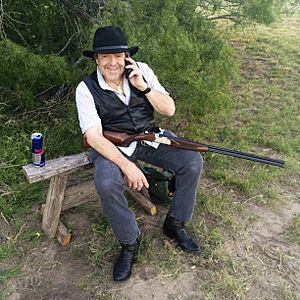
In 2012, Barlow also helped found the Freedom of the Press Foundation. He had public discussions with people like Edward Snowden and Julian Assange, supporting Snowden as a hero for revealing government secrets.
Barlow was an expert at the Berkman Center for Internet and Society at Harvard Law School. He also taught about "cyberspace" at the European Graduate School in Switzerland.
In his final years, Barlow traveled a lot, giving talks about civil rights, freedom of speech, and the future of the internet. He spoke at many events and universities around the world.
He also advised several organizations focused on technology, the environment, and media. He was involved with a company called Algae Systems, which worked on new ways to create fuel from algae. He wanted to be a "good ancestor" by helping to solve environmental problems.
Personal Life and Challenges
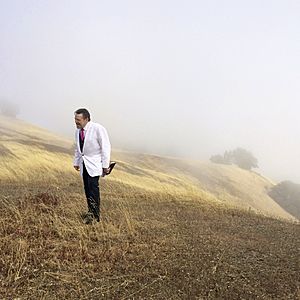
Barlow was married to Elaine Parker Barlow and they had three daughters. They later divorced. He also had a close friendship with John F. Kennedy Jr., who spent time at Barlow's ranch as a young man.
In 2014, Barlow lost his beloved cat, Buck, who had many fans online.
After a series of health issues, Barlow had a serious heart attack in 2015. A fund was set up to help with his medical bills, and a concert was held with famous musicians like Bob Weir and Sean Lennon to support him.
Barlow was also a self-ordained minister, performing baptisms and weddings.
His memoir, Mother American Night: My Life in Crazy Times, was published after his death in 2018. It tells the full story of his life.
Passing Away
John Perry Barlow passed away in his sleep on February 7, 2018, at his home in San Francisco. He was 70 years old.
Images for kids
See also
 In Spanish: John Perry Barlow para niños
In Spanish: John Perry Barlow para niños
 | Kyle Baker |
 | Joseph Yoakum |
 | Laura Wheeler Waring |
 | Henry Ossawa Tanner |


